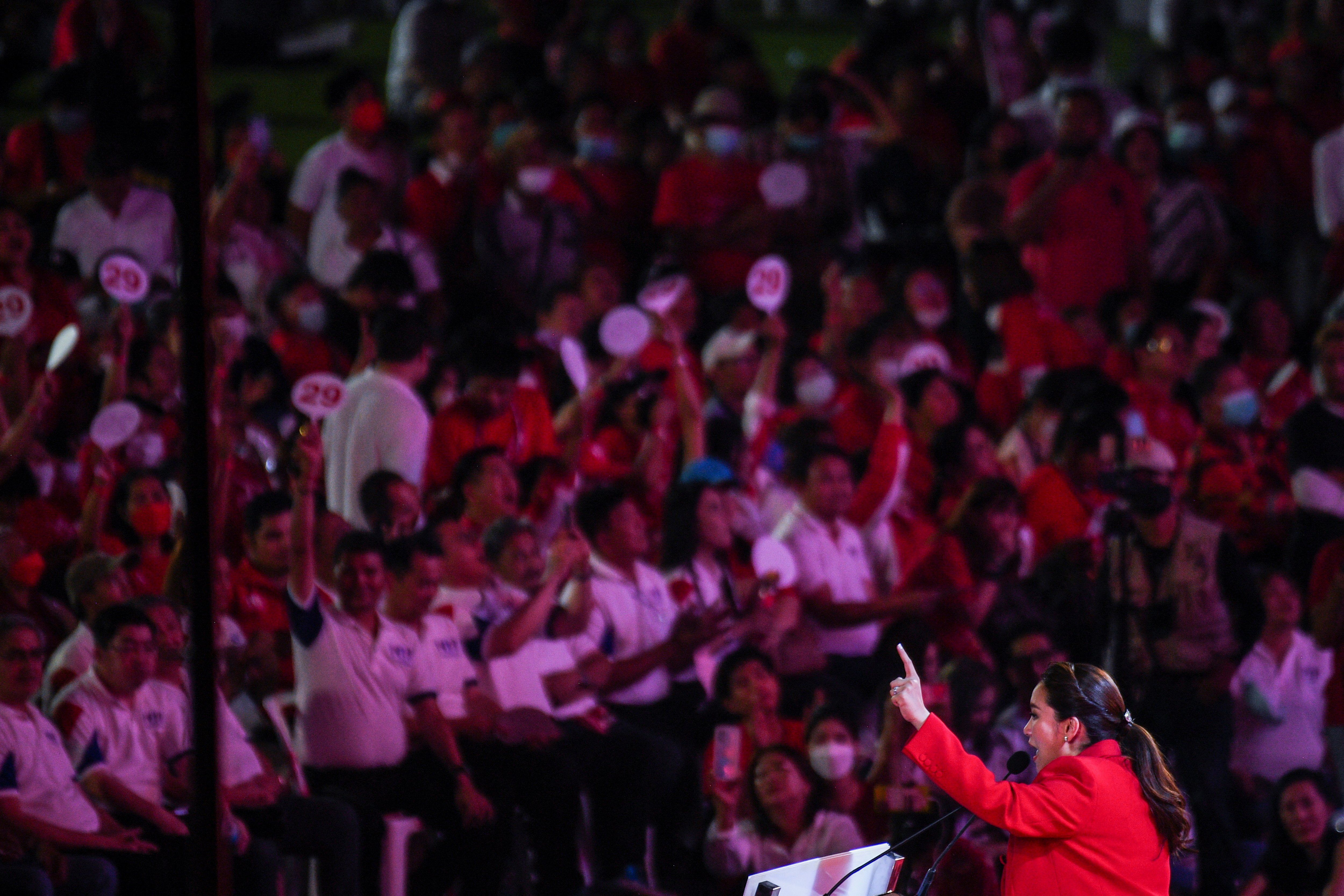Former PM Thaksin Shinawatra remains a powerful force in Thai politics 17 years after the military ousted the billionaire businessman from office and drove him out of the country. His party, Pheu Thai (or its predecessors), has won the largest number of seats in every election since 2001 with its populist appeals to the rural poor. But it has been twice ousted from power via military coups. In addition to Thaksin (Thais go by their given name), his sister Yingluck suffered a similar fate, in 2014.
Ahead of the May 14 elections for the House of Representatives, Pheu Thai is getting a fresh boost from the next generation: Thaksin’s daughter Paetongtarn, 36, has emerged as an energetic campaigner and one of the main contenders for prime minister. Yet Pheu Thai faces a battle obtaining the nation’s top job given the conservative establishment’s dominance of the political system.
We asked Eurasia Group expert Peter Mumford to explain why.
Who are the main candidates and parties running on the establishment side?
United Thai Nation, led by 2014 coup-leader-turned-PM Prayut Chan-o-cha, and Palang Pracharat Party, led by Deputy Prime Minister Prawit Wongsuwan (both military-linked parties), as well as the Democrat Party are the main parties of the conservative establishment – wealthy Thais, the military, and ardent supporters of the monarchy. The Bhumjaithai Party also leans conservative and is in the current ruling coalition, but it is more ideologically flexible than the others. Fragmentation within the establishment will be an important watchpoint for post-election government formation talks.
What about the opposition?
Pheu Thai has nominated three candidates (the maximum allowed per party) for prime minister; the two key ones are Paetongtarn and Srettha Thavisin, a real estate tycoon. Move Forward — the successor to Future Forward, which was dissolved in 2020 — is the other main opposition party. Its leader, Pita Limjaroenrat, is the party’s sole nominee for prime minister. While Pheu Thai and Move Forward share a desire to reduce the military’s influence in politics, they otherwise have little in common. Pheu Thai’s heartland is the populous, mostly rural and poor north and northeast regions, whereas Move Forward’s strongest support is among young, middle-class urban voters, many of whom are not fond of Thaksin or his daughter, a political novice. Moreover, Move Forward has dared to discuss the role of the country’s monarchy, a sensitive issue, though it has backed away somewhat from this recently. But its stance has helped it to win the support of student protesters who took to the streets in 2020-2021, calling for democratic reforms and checks on the monarchy’s power.
Who's leading the polls?
Pheu Thai is far ahead. It is highly likely that it picks up the most House seats, by a comfortable margin, but polling is not accurate enough to give us a reliable steer on the likely scale of its victory. Move Forward is second in most polls and appears to be gaining ground.
It looks like the Thaksin-backed party will surely win but won't be able to govern. Why is that?
The country’s 2017 constitution gave the junta the right to appoint 250 senators, who remain in office until 2024 and will vote together with the 500 members of the House to choose the next prime minister. This gives conservative parties an in-built advantage. So, the House elections will not directly determine who leads the next government, though the results will shape coalition negotiations.
The vote for prime minister will take place after the junta-appointed Election Commission has confirmed at least 95% of the House results — it has up to 60 days to do so. There is no time limit on the selection of the prime minister; in 2019, it took about two months from polling day until a new officeholder was confirmed.
What would need to happen for Paetongtarn to become PM? Would the army allow it? Why is Thaksin's daughter so popular?
To get the 376 votes required to secure the premiership, Pheu Thai would need to either assemble a coalition of that many seats in the House or somehow obtain the backing of at least a portion of the senators. On the latter option, it is thought possible that Pheu Thai could join forces with Prawit’s Palang Pracharat Party, even though the two have been fierce opponents. Prayut, on the other hand, is much less likely to consider working with Pheu Thai.
As a member of the Shinawatra clan, Paetongtarn is both wildly popular with Pheu Thai’s supporters and contentious for conservatives. Promises of expensive giveaways such as a 10,000 baht ($290) one-off payment for every Thai citizen 16 years old and above have also surely helped. Pheu Thai could put forward Srettha for the premiership instead, in the hope the well-known businessman is more palatable to senators.
A Pheu Thai-led government would likely face legal and constitutional pressure, and potentially another coup.
Is there any chance her dad will be allowed to return to Thailand?
This is conceivable if there is a Pheu Thai government, though it would likely trigger protests by pro-establishment supporters and possibly raise the odds of a coup.
Edited by Jonathan House, Senior Editor, Eurasia Group.
